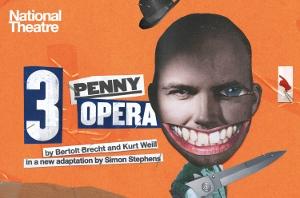The Threepenny Opera Review
The National have previously staged The Beggar's Opera, John Gay's folk opera from 1728 that was one of the first British musicals, back in 1982. Then in 2000 it staged a contemporary rewrite The Villain's Opera. Now they finally tackle the scattergun but powerful Brecht/Weill version, inspired by the same story, first premiered in 1928 in Berlin, at the same time that yet another brand-new rewrite of the original source material The Busker's Opera is being staged at London's Park Theatre.
There's obviously an enduring fascination and timeless appeal for the bold satirical strokes of this malleable story of lowlifes, criminality and justice. The particular joy of the Brecht/Weill version, of course, remains its insinuatingly dark musical score, pulsing with brass, strings and harmonium sounds, and rendered here with stunning élan under the musical direction of David Shrubsole for his onstage band.
A wonderful cast is also full of great voices, not least National regular Rory Kinnear who surprises in his first stage singing role as Macheath, but also joined by more established musical theatre voices like Nick Holder and Haydn Gwynne, both in robust, outrageous form as the Peachums who control London's beggars, and whose daughter Polly (the ever-ravishingly voiced Rosalie Craig, recently seen on this same stage as Rosalind in As You Like It) marries our anti-hero Macheath.
There's also a scene-stealing turn from Debbie Kurup as Lucy Brown, another woman that Macheath is toying with. The scene where Polly and Lucy both visit him in prison at the same time is one of the comedy highlights of the evening. This broadly painted social satire is also given illuminating colour with a wonderful turn from George Ikediashi - best known as London cabaret car Le Gateaux Chocolat - as the Balladeer, and a brilliant ensemble also refreshingly includes a wheelchair-using actor Jamie Beddard, which I draw attention to only because it is so unusual to see on a London stage, but should be a commonplace.
There's a lot less set than usual at the National - has austerity set in as the set budget been used up on shows like wonder.land? Maybe that's why the National has informed the press that they will have to pay for second tickets for their guests in the future. But the bare-bones aesthetic gives it an appropriately raw, ragged feeling that matched the jagged drama.
Originally published on
